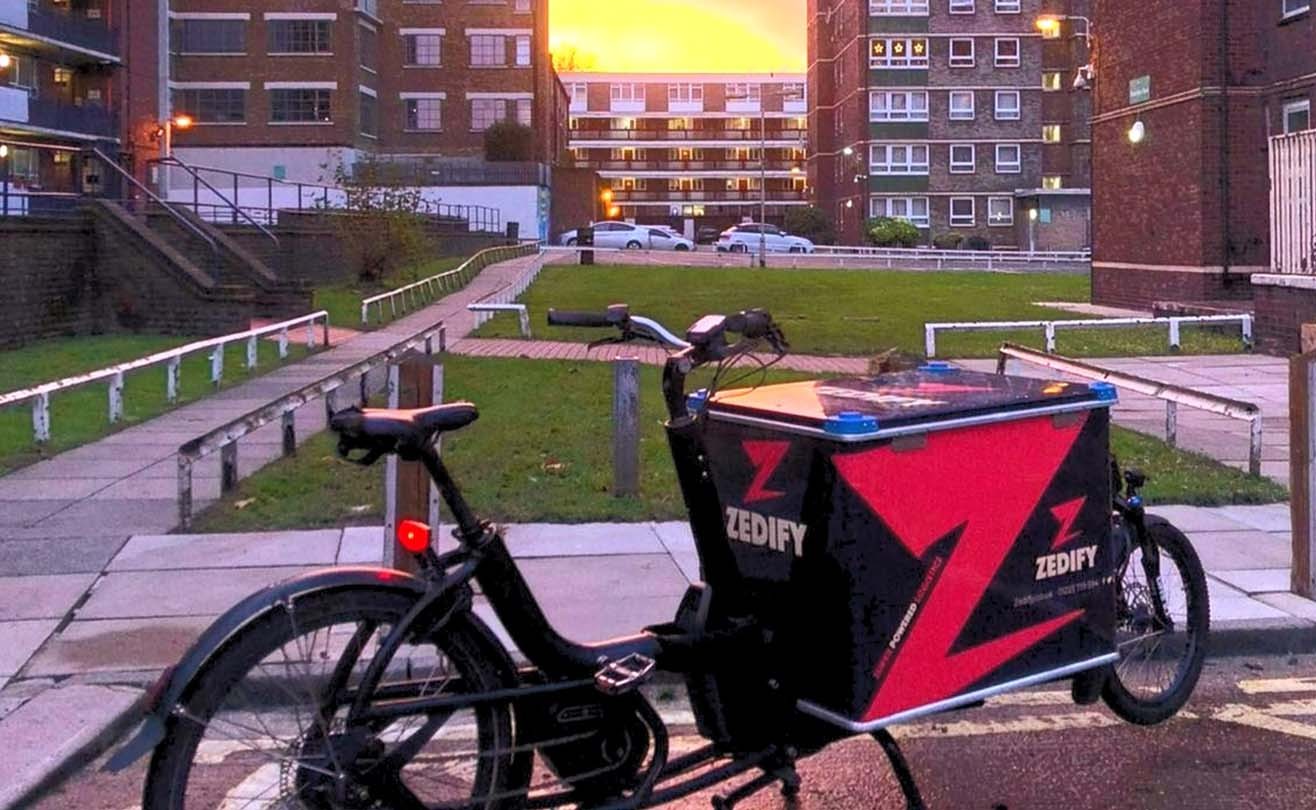
Blog/Avoidgreenwashingandleadthepackonsustainableprogress
 April 18th, 2024
April 18th, 2024 Bex Young
Bex Young 9 minute read
9 minute readAvoid greenwashing and lead the pack on sustainable progress
Greenwashing is far from a new term. Recently, it’s become bit of a hot topic, with a string of high-profile cases of well-known brands being called out for messaging on products and in advertisements – either not giving as much back to the environment as they claimed or, in some cases, actually being worse for the environment than the status quo. With new regulations coming into play, and an increasingly savvy public sniffing out false claims from all angles, how can your brand avoid greenwashing while leading the charge towards a brighter, greener future?
At Zedify, we’re pedalling a path to victory with environmentally conscious last-mile delivery using a sustainable cargo bike fleet, so we are very much navigating a path when it comes to balancing sustainability claims in our messaging. We have a tonne of experience working with a wide range of retail brands to help them incorporate sustainable messaging regarding sustainable deliveries, helping brands to back up their claims with solid evidence.
Here, we wanted to go back to basics. If you want to avoid greenwashing, you need to understand what it means, why honesty and transparency matter, and how you can improve your efforts so any environmental claims you make can be backed up – and in this article, we’ll explain just that.
What is greenwashing?
So, what is greenwashing? And, while we’re at it, what is “greenhushing”?
Greenwashing is the act of dressing up your activities so they look more environmentally friendly. This could be overreporting on their impact, or hiding the negative impacts and only focusing on the positive ones. Greenwashing generally paints the activities of a business as a net-positive to the planet, when in reality they’re often quite detrimental.
Greenhushing, on the other hand, refers to the inverse – companies deliberately not reporting on their green credentials and efforts to avoid scrutiny. This can be because of a fear of being outed as a greenwasher (quite a reasonable concern given the current landscape), but can also be a form of greenwashing itself – making a small mention about their green endeavours, and leaving the rest to extrapolate and expand in the minds of the public.
In either case, these ideas revolve around the environmental activities of organisations and how honest they are when talking about them. Greenwashing can easily be avoided by actually investing in credible policies and measures, and being honest, upfront, and informed about the environmental impact of your business.
A policy of honesty
When it comes to conduct and governance, putting honesty at the heart of your corporate policies is about to become more than just a virtue.
The Competition and Markets Authority (CMA) have released guidelines on how companies should present their environmental efforts, with codes coming into effect from as early as September 2021.
May 2024 marks the next step in these regulations, where legislation will come into play that further protects consumers from misinformation around environmental claims. This includes a focus on:
- How claims are made
- Any supporting evidence
- Whether claims influence consumer behaviour
- If an absence of information is also misleading
Our own research has shown that 50% of retail logistics leaders are worried they’ll be accused of greenwashing if they make claims about the sustainability of their deliveries. The current climate has led to the risk all sustainable innovations are happening on the down-low for fears of overstating their impact.
Understanding where you are in the supply chain, and the pros and cons of each moving part, can help you stay afloat – keeping you compliant, while also not shying away from the truth of your environmental impacts and efforts.
Find out more about eco-friendly parcel deliveries for retail in our report >
Navigating upstream vs downstream impacts
Depending on which part of the supply chain you are focused on for your impact journey, there will be different challenges when it comes to measuring and improving the your sustainable performance. .
The procurement of materials is known as “upstream”, while the act of creating and distributing products made from these materials is known as “downstream”.
It can be difficult to adequately predict the impact of the materials in the upstream part of the supply chain as there are so many suppliers – each with their own unique processes. While your own Scope 1 activities should be relatively simple to map out and capture data on, the length and breadth of the supply chain makes it challenging for the ultimate impact to be properly understood.
For example, understanding the amount of energy you use in-store to keep the lights on and the fridges running is quite simple. However, if you want to look at the entire carbon trail of products from source, through the various transportation modes, and finally to your shopfront ore warehouse, it becomes a lot more complex.
What have brands got wrong?
Greenwashing regulations aren’t just for show; many brands have already been caught out by them across the globe. Examples include:
- Volkswagen: faced backlash for cheating on emissions tests in 2015.
- McDonalds and Starbucks: heavily criticised for replacing plastic straws with solutions that are just as, if not more, harmful for the environment.
- Walmart: exposed for false claims on the use of bamboo in products, leading to a $3 million fine.
While many of these are big players, that doesn’t mean they’re the only ones who should be watching out for greenwashing their environmental impact. Every business, small or large, should strive to make their processes as green as possible – and be honest about it as well.
How to prevent greenwashing and improve your environmental efforts
The easiest way to prevent greenwashing is to be open and transparent with customers along your journey. This includes giving reasoning behind your choices, showing what you’ve done and what you haven’t, and giving a roadmap on what you plan to do.
Anti-greenwashing goes hand-in-hand with your environmental efforts. Finding ways to improve the environmental impact of your business operations will give you something to speak proudly about, while also helping your business towards a more sustainable future.
Here are our top paths to take that don’t involve washing over your actual impact:
-
Material sourcing
Getting your materials, be it product or packaging, from more sustainable sources is a great way to cut down on the overall environmental impact of your business. Think honestly about where you’re at, and be open with all your communications – then take steps to improve.
Foundations like https://c2ccertified.org/the-standard exist to help promote the reduction of waste in materials and textiles, while new traceability tools – such as in the use of product passports – mean that consumers can know more about the impact of their purchases.
By working in-depth with suppliers, and across industries with other related businesses – or even taking a leaf out of a company like Tony’s book – you’ll be able to properly assess and work on the sustainability of your materials.
-
New business models
Changing your business model and adapting it to the times can be a scary move – but it doesn’t have to be. Big brands like Decathlon embody these steps towards sustainability, and brands are really shifting the dial towards practices and models involving the resale, rental, repair, and recycling of goods.
-
Logistics and distribution
The goal for your distribution isn’t just to make “green delivery” claims when you’re just offsetting or working with a delivery partner who only has a small number of EVs in their fleet.
You should really challenge your providers to demonstrate how their model will help you decarbonise your logistics – then share this journey with customers as part of your delivery touchpoints.
There are a few distribution methods that can benefit you, including:
Electric Vehicles
Electric vehicles, or EVs, are more than just an emerging market. With hundreds of models to choose from and ranges of up to and over 200 miles, EVs are able to fulfil large deliveries with a to facilitate the transition away from fossil fuels.
Cargo Bikes
Cargo bikes are the perfect fit for urban environments, and can easily be deployed for last-minute last-mile delivery. While there are some scarce few packages that our couriers naturally can’t handle like large furniture or particularly heavy parcels, they can fulfil the majority of orders in our cities.
Electric motors and peoplepower are the only fuels required for cargo bikes. This means the bikes offer incredibly minimal impact on the environment in comparison to vans, and offer extreme positives like zero tailpipe emissions when compared to the gas-guzzlers and diesel vehicles that make up a lot of courier fleets.
If you’re interested in making use of our cargo bikes or EVs, contact the team today!
-
Being clear and real
As we mentioned earlier, honesty is the best policy! If you’re clear and informed, you can be confident. This means avoiding overstating the impact of your actions while simultaneously shifting the dial in your industry – making your brand an aspiration for others, while building loyalty and trust in the consumer values of today.
If you have made mistakes in the past, this is the time to own them and show how you’ve evolved on your sustainability journey. Take the time to eliminate ambiguity – don’t just use buzzwords or fancy imagery, instead show in clear terms how you’ve changed for the better.
Sustainable brands grow an extra 31%, year on year, so being transparent, real, educating yourself, and putting in the effort will give you results and make your business bloom.
Sustainable last mile delivery from Zedify
The most important part about making an environmental statement is to be open and honest. Don’t try to cover people’s eyes with tales of fancy – they will find out, and your business may be hit with more than just a dose of poor public perception. Being communicative and real with what you’re delivering will go a long way.
Sustainable last-mile delivery from Zedify can take you even further, offering more than just words for your environmental efforts. Get a quote from us today to finish your last-mile with our cargo bike couriers, or read all about us in some related articles:
Find out how cargo bikes are helping companies work towards net zero >
Bypass the last-mile blockages to promote your business’ growth – find out more >




